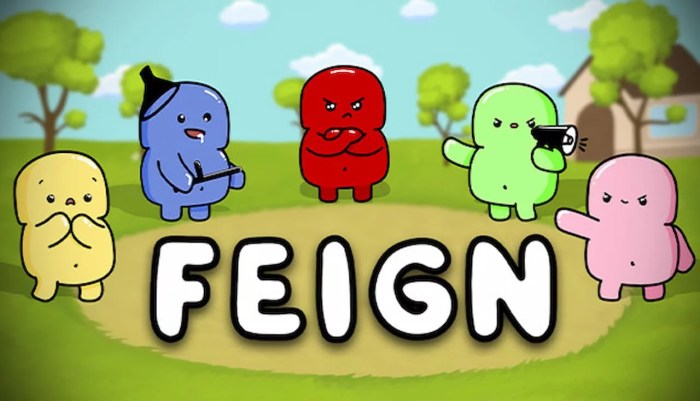The guidewords for the word feign are – The guidewords for the word “feign” offer a comprehensive understanding of its definition, etymology, synonyms, related words, literary usage, and cultural implications. This in-depth exploration unravels the nuances of “feigning,” shedding light on its diverse meanings and societal significance.
Delving into the historical roots of “feign,” we trace its etymological journey and examine the evolution of its usage. The analysis of synonyms and antonyms provides a deeper understanding of its semantic field, highlighting subtle distinctions in meaning.
Definition and Meaning

Feign is a verb that means to pretend or to give a false appearance of something. It can be used in a variety of contexts, from feigning illness to feigning interest in a conversation. The word “feign” has a negative connotation, as it implies that someone is being dishonest or deceptive.
Etymology and Origin

The word “feign” comes from the Latin word “fingere,” which means “to shape” or “to mold.” This suggests that the word “feign” originally meant to create something that was not real. Over time, the meaning of the word has evolved to include the idea of pretending or giving a false appearance of something.
Synonyms and Antonyms

Synonyms
- Pretend
- Dissemble
- Simulate
- Fake
- Counterfeit
Antonyms, The guidewords for the word feign are
- Be honest
- Be truthful
- Be genuine
- Be authentic
- Be sincere
Related Words and Phrases

- Feign illness
- Feign interest
- Feign ignorance
- Feign concern
- Feign sleep
These phrases all involve pretending or giving a false appearance of something. They can be used in a variety of contexts, from everyday conversation to formal writing.
Usage in Literature and Media
The word “feign” is often used in literature and media to create a sense of suspense or drama. For example, in the novel “The Great Gatsby,” the character Jay Gatsby feigns wealth and success in order to win the love of Daisy Buchanan.
This deception ultimately leads to his downfall.
Cultural and Societal Implications
Feigning can have a negative impact on social interactions and relationships. When someone feigns interest or concern, they are not being genuine. This can lead to feelings of distrust and resentment. In some cases, feigning can even be considered a form of lying.
User Queries: The Guidewords For The Word Feign Are
What is the definition of “feign”?
Feign means to pretend or give a false appearance of something.
What are some synonyms for “feign”?
Some synonyms for “feign” include pretend, dissemble, simulate, and affect.
What are some antonyms for “feign”?
Some antonyms for “feign” include reveal, disclose, and expose.
What is the etymology of “feign”?
The word “feign” comes from the Latin word “fingere,” which means “to form or shape.”
How is “feign” used in literature?
“Feign” is often used in literature to create suspense or to deceive the reader.
What are the cultural implications of feigning?
Feigning can have both positive and negative cultural implications. On the one hand, it can be seen as a way to protect oneself or others. On the other hand, it can be seen as a form of dishonesty.